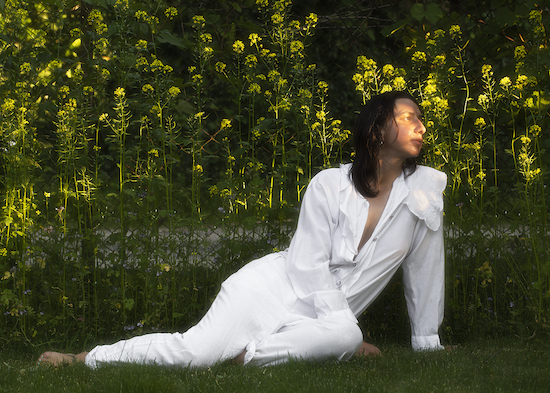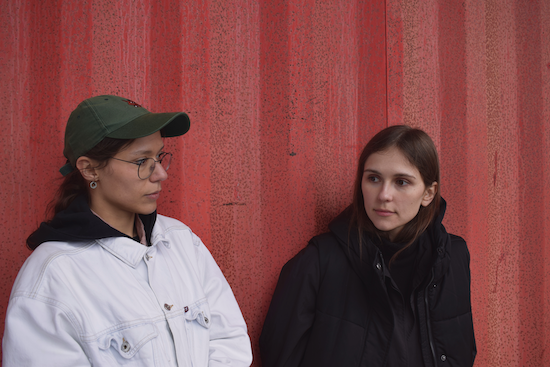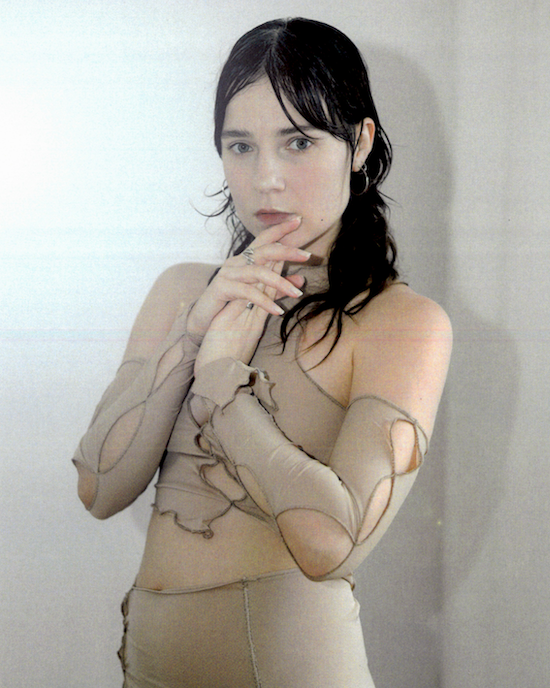Martyna Basta, photo by Majka Zawrzykraj
“Everything makes a sound,” says Martyna Basta, as she taps a glass during our Zoom conversation. “The most exciting sounds hide where we don’t expect them. When I take the simplest recording, I start to transform it. We don’t need instruments, because we can create abstract sound spaces not associated with the source.”
Field recordings are the core of her latest album, Slowly Forgetting, Barely Remembering, although it’s not easy to recognise them as such. The music sounds electronic, even though she used no synthesisers during its production. The starting point is acoustic. Take ‘Speechless Lately’, for example, based on recordings of an ice cube, foil blowing in the wind, rustling leaves captured by a contact microphone, a wine glass that’s transformed into a drone. She adds the sounds of zither and electric guitar, introducing scratches of melody to a story suspended in time. She plays with silence, meticulously building with small details. “Sounds recorded in space and thrown into the electronic world have much more potential,” she says. “There’s potential for the things hidden in the details, it’s much more colourful and deeper than a dull MIDI sound.”
Basta’s music is like time encapsulated as sound. The title of her last album evokes the idea of a semi-memory, one where it’s unclear whether it really happened or if it’s something we created. “For me, these reflections, these pranks of memory, found their place somewhere in my process, which involved rummaging through archives but also adding something from the present, going back to libraries and digging up things I didn’t remember ever creating,” Basta says. She creates something from the reality that is here and now; the sounds are natural, they are actual, they had their place and their time that she was there to experience. She translates that into music, giving them a fundamental meaning.
That music is sometimes dark, mysterious, or frightening. The theme of memory can trigger specific anxieties. Sound, for her, can be a statement from the registers that people tend not to talk about, the hidden fears constantly bubbling up inside. “I like to listen to music that causes discomfort. It is exciting; I rarely listen to anything for relaxation. Music doesn’t necessarily have to be pleasant, it can stimulate completely different centres,” she explains.
The term ‘field recording’ might evoke the idea of natural landscapes, but many of Basta’s are sourced indoors: ‘home recordings’ that pay attention to the micro sounds of the domestic and the memories they might evoke. She usually has a recorder with her, she says. “Sometimes I have a goal, I go out to look for a particular sound or go somewhere where I can, for example, break glass and record it. But most of the time I hear something, pull out the recorder, and it transforms into something I never expected.” She uses the recordings as an archive. “I often go back to those I made a few years ago and suddenly discover that a sound fits perfectly with my current thoughts.” It’s an archive that’s constantly growing, an almost endless source of creativity.
Basta started by playing classical guitar at music school at the age of six, but after defending her diploma, for which she played a Mauro Giuliani concerto, she turned down the opportunity to move ahead into a musical academy and didn’t bother submitting her papers. Her education thus far had allowed no room for experimentation; everything had to be performed without a single mistake. Nowadays, she allows herself to play in the opposite fashion. “Music is often created spontaneously and intuitively, and an ‘error’ can determine a composition. That error allows me the freedom to create. Getting out of that framework was liberating for me.”
Slowly Forgetting, Barely Remembering is Basta’s second album released via Slovakia label Warm Winters. In 2020 she had participated in the open call for Rewire Festival – held online due to the pandemic. She was included in a radio play featured on the festival’s website, which was then seen by the label’s Adam Badí Donoval, who offered to first release her music. Her debut, Making Eye Contact With Solitude was made amid the solitude of the pandemic, as an effort to convey the things she couldn’t express with words. Her new album reaches even further into the self, all the way into memory. It also sees her return, after years away, to the guitar. The desire to do so has been dormant for a long time, she explains. Her years of study left her with considerable skills, after all. “It was worth using them, seeing how I would approach the instrument now. I came across it completely differently,” she says.
One of the artists who inspired Basta to make music was Claire Rousay, whose album A Softer Focus left a significant impression. In turn, Rousay has since been inspired by Basta. The two are planning a residency during the summer, the results of which will be presented at this autumn’s Unsound Festival in Kraków. Basta will also appear on Rousay’s new album.

Antonina Nowacka, photo by Filip Preis
She’s one of a number of female composers currently on the rise in Poland, all of whom were born in the early 1990s and who explore themes of anxiety and mystery through music that requires concentration. Among the best-known is Antonina Nowacka, who produces the music for audiovisual project WIDT (her sister Bogumiła Piotrowska provides visuals). She released Lamunan, a solo showcase of her vocal skills, in 2020, while last year saw the release of Languoria, recorded with Sofie Birch. The former is a meditative and chanting piece recorded from the island of Java to a fortress in Poland. The collaboration with Birch, meanwhile, tends towards tranquillity and contemplation. “I think there’s a strong need for quiet,” Nowacka tells tQ. “Especially because of the omnipresence of noise and echo. At least, I get a lot of messages saying as much from friends, acquaintances and strangers.” She makes music that, first and foremost, she can resonate with personally, and that fulfils her energetic needs. “For me, music, especially singing, is a process that provides emotion and a sense of the beauty of existence. That might sound banal, but it’s quite simple. Perhaps it has something to do with meditation.”
The bright colours of Nowacka’s music provides a contrast to that of Aleksandra Słyż, who released her debut album Human Glory via Pointless Geometry in 2020, which she made partly with movement sensors, which enable the sonic recording of choreography. Last year saw Warm Winters release her album A Vibrant Touch, long drone compositions that combine acoustic and synthetic sounds based on string and wind instruments. They slowly but intensely pulse and resonate in the surrounding space, a lesson in deep listening and delving into the dark corners.
“I’ve always felt that the slower and smoother the changes – in harmony, dynamics, the intensity of structures, etcetera – the more we lose our sense of time. We can focus on the ‘present moment’ of the piece, but at the same time also feel it better on its larger, macro scale, says Słyż. “On the other hand, I love to create structures in which the change between consonances is almost imperceptible, or so stretched out that the listener no longer hears only ‘harmony A’ then ‘B’, but the whole journey that happens inbetween.”
Teoniki Rożynek composes primarily for theatre and film, where she provides instrumental, electroacoustic and electronic music. She rarely puts out standalone releases, although there are some notable exceptions, such as a recording from the 14th Mózg Festival, and a contribution to the Canti Spazializzati series. Rożynek’s music results from her experience playing the violin in her youth, and old synthesisers whose sounds change over time, embracing their deformations and dirtiness.

Aleksandra Słyż and Teoniki Rożynek, photo by Tomasz Koszewnik
At the Ephemera Festival in Warsaw later this month, Rożynek and Słyż will join their considerable forces for a special performance marking the summer solstice. The work, ‘And The Sun Stood Still’, explores by the primal mysticisms inspired by the sun, and will be performed alongside musicians from the Witold Lutosławski Concert Studio Of Polish Radio in Warsaw. “I think it will be a beautiful mix of our two personalities. I have a terrible appreciation for Teoniki’s work, and although we move in entirely different genres, we can find a lot of common ground in music that fascinates us,” says Słyż. Elsewhere at the festival, Basta will be performing a set of her own.
Uniting this generation of young composers is a sense of non-obviousness, and a tendency towards darkness. Although Słyż prides herself on being an optimist within this context, she echoes Basta’s opinion that music that causes discomfort can also be enjoyable. “I love that, as humans, we have a whole spectrum of emotions within us and that we need to be able to face them all,” she says. “And if we don’t allow fears, anxieties, or despair into ourselves, we probably won’t be able to experience those positive feelings healthily.”
Martyna Basta, Teoniki Rożynek and Aleksandra Słyż will all perform at this year’s Ephemera Festival, which takes place in Warsaw, Poland, from 15 to 18 June. For tickets and information, click here.


